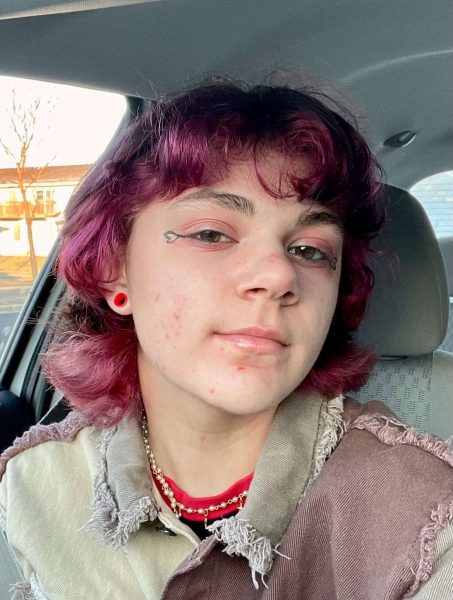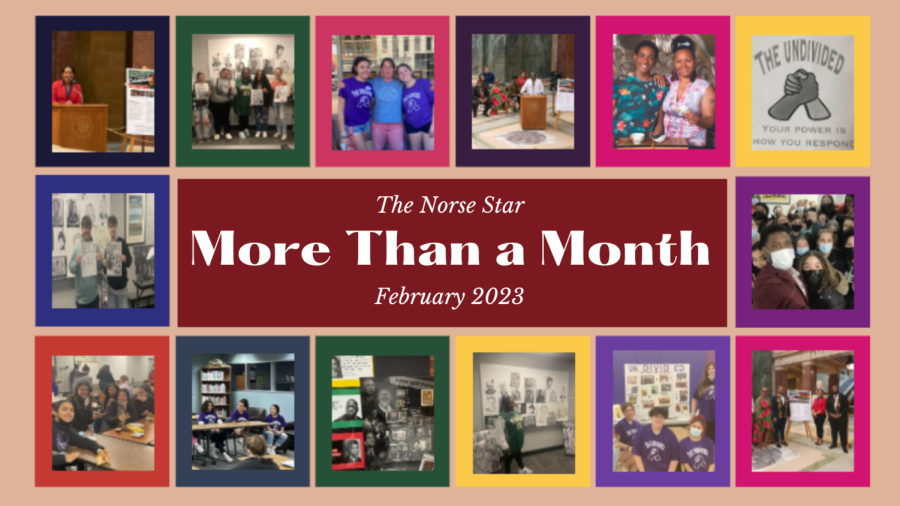More Than A Month
Photo Illustration by Madeline Monthie. All photos submitted by Deanna Roberson, Dora Drake, Priscah Norton, and Aureal Ojeda.
INTRODUCTION
Beginning in 1915 as a way to honor and celebrate African American history, February has been known as Black History Month. Since then, the fight for Black justice has grown, and the necessity of celebrating it has become more apparent. This month, the Norse Star explored several people and organizations all dedicated to improving our community through the fight for racial justice to see what Black History Month means to them, and how the recognition of African Americans in our society reaches beyond just a single month. From the displays around the halls of Stoughton High School to local businesses in our community to the Wisconsin State Capitol building, the importance of celebrating black history is undeniable. This Black History Month, we look to the past to explain the present; we look to the past to change the future.
SMALL BUSINESSES
February may be known for Black History, but it is not solely celebrating the past. In fact, according to four Black small business owners, they see an opportunity to support Black livelihoods while ordering online and every drive down Main Street. In their view, Black-owned small businesses in Wisconsin, while the minority, are valuable and reputable places to find long-lasting products.
“2020. Remember that year?” asks Briana Raday, owner of local Stoughton store Sun & Lace. “That’s when [my business] started getting more press.”
She explains that that year, retailers popularized the “15% pledge” to source 15% of their stock from Black-owned businesses. Three years later, Raday sees her homemade children’s shoes and accessories selling alongside brands such as Nike and Adidas in Nordstrom.
Since the Black Lives Matter movement has gained more traction in the last few years, the popularity of Black-owned businesses has increased proportionally—but these store owners are here to share that it’s vital to ensure that support isn’t performative.
Milwaukee-based Out- woken Tea owner Aureal Ojeda says, “There was one company [wanting to work with me] that had no interest in my business. They only wanted to say, ‘Oh, this is a Black-owned business,’ but I’m much more than that.”
Oftentimes, Black- owned business owners use their platform to take on activism and heavy-hitting topics. However, the value these businesses present doesn’t necessarily rely on that activism—at times, their goal can be as simple as providing your morning cup of coffee.
After moving from Kenya to the United States over 15 years ago, the owner of Coffee4All, Priscah Norton, has catered to Stoughton’s tastes while allowing customers to experience tastes they haven’t tried before.
“I use my culture as a base for the recipe […] and adopt the preferences of the American taste [to] bring the two together,” Norton says.
Norton explains the cultural blending she’s explored since opening her business is in memory of her late husband, who passed away from medical complications in 2020.
“It’s amazing, the influence I have in terms of food—I thought it was unique, but came to find out different cultures across the world have the same food, but they call it [different names] or use different spices,” Norton says.
Norton’s company serves as a reminder of the value of businesses based on cultures outside of what some in Wisconsin might be used to, and Black History Month creates a space to appreciate that.
“Black History Month means a lot to so many of us, celebrating the achievements of African Americans and being able to recognize our central role in [American] history,” Norton says.
While Norton’s business brings aspects of African culture through food, Milwaukee-based clothing brand Chase My Creations puts activism first and foremost, according to owner Chloe Longmire.
“I like to think that I didn’t choose [to make] clothing; clothing chose me,” Longmire says.
Her original business sold earrings, which she used to show aspects of Black culture and activism through an artistic lens. Then, once commissioned to make an anti-racist shirt, a new business opportunity arose.
“I’ve never held back, but now I really don’t hold back,” Longmire says.
She started with more general designs and worked her way up into blatant anti-racism—although she still sells some of the tamer designs.
Her business has been her sole source of income for a year, and dedicating her livelihood to this craft has made her a more prominent and deliberate activist.
“I’ll be satisfied [with the fight for antiracism] when there’s no need for me to sell shirts like these anymore because it’s just common sense,” Longmire says.
She believes that activism should reach beyond a single month of effort, as consistent activism is the only way to make a change.
“Black History Month is more than just a month. It’s a time [that lets us talk about these issues], but we should be celebrating Black History 365 days of the year,” Longmire says.
Raday of Sun & Lace commented similarly on the month. Recently, February has been known as Black History and Futures Month. This new name adds a focus on Black pride, rather than just reflections.
Raday’s Stoughton-based business Sun & Lace provides quality leather footwear and accessories for kids that are locally sourced and hand- crafted. Her business has grown considerably since she started it in 2016.
“[At the start], I was telling people, ‘two weeks for a pair of shoes.’ Now in two weeks, I can make 200 pairs of shoes,” Raday says.
Raday takes inspiration from her kids when it comes to her shoes, as they’re the reason she makes shoes in the first place. She began making shoes for her first son because the ones on the market didn’t match her style.
Raday also prioritizes educating her children on Black history in February, and every other month.
“[Conversations about Black History are] in our books. It’s in our conversations on the ride to school,” Raday says. She’s also planning a Black History Month celebration at St. Ann’s throughout the month to further educate youth about Black History.
Although Raday is a strong presence in representing Black-owned Stoughton businesses, there’s not many of those businesses to be found. Raday is one of only two Black-owned businesses on Stoughton’s Main Street.
“I want to keep up the presence here. I’ve tried to become more involved in the community so kids can see that people of color can own businesses and be successful,” Raday says.
While businesses like Sun & Lace and Chase My Creations put effort towards racial activism, Outwoken Tea’s owner Aureal Ojeda focuses on environmental activism.
“Tea […] started to become ritual and gave me the space to clear my mind. I started to learn deeper about the culture, the history, the agriculture behind it,” Ojeda says.
She chose the name of her business, Outwoken Tea, after a negative experience in which she asked a manufacturer for compost- able or post-consumer use packaging, at which the manufacturer essentially mocked Ojeda for suggesting such a thing.
“I thought to myself, what year is this guy in? He needs to wake up, someone needs to shake him […] he needs more than that, he needs to be out-woken. And that’s where it came [from],” Ojeda says.
Ojeda had been a single mother for many years before meeting her husband and can relate to stories of financial struggles. That experience, combined with her environmental back- ground, is why she aims to do as much good with her business as possible.
“Whatever I did, I could not be another business that ended at the landfill. Otherwise, it felt like: why was this perspective given to me? A lot of people don’t see what I see. They think they just put their garbage to the curb and it’s gone, [but] it’s not,” Ojeda says.
Although Ojeda avoids promoting her business as Black-owned, she educates her son on Black history this month, and she makes an effort to support Black communities.
“Economically, I feel some laws need to be changed, some laws that are put in place that specifically target certain cultures. The system is against [Black people], especially when they start redlining certain communities,” Ojeda says.
Redlining was a practice popular in the 1960s in which poorer communities of color were deemed hazardous, and people living there could be refused bank loans. This trapped people of color in low-income situations, still affecting America’s pop- ulation today.
“[The government] needs to hold themselves accountable, and start going around to these comm- unities and asking people, ‘What can we do?’,” Ojeda says.
Wisconsin’s small businesses benefit and enrich the state. The activism and individual craftsmanship these businesses bring to Wisconsin deserve recognition, especially during Black History Month. However, acknowledging and supporting Black- owned businesses shouldn’t be limited to a month. Rather, they should be supported throughout the year, and all years to come.
STATEWIDE
Throughout the month of February, the Wisconsin State Assembly Black Caucus held several events in honor of Black History Month. These ranged from town halls discussing various issues facing African Americans in Wisconsin—such as discrimination, access to voting, education, employment, housing, and healthcare—to ceremonies celebrating Black historical figures. All of these events aimed to educate the people of Wisconsin on Black history, the accomplishments of African Americans, and the issues that African Americans face today.
Many of these events were led by Representative Dora Drake, chairwoman of Wisconsin’s Legislative Black Caucus and State Representative for the 11th Assembly District (which is made up of the Milwaukee area) for three years. Drake was elected to her first term in 2020.
“We know the importance of not only celebrating [Black] history but acknowledging that Black history is American history. [February] is a month where we get to highlight some of the achievements that [Black] people have done specifically in our state, but also highlighting the issues that are specific to African Americans,” Drake says. “It’s a reminder for us of who’s come before us, who has paved the way, and those who have passed away, and we do that in remembrance of them; we carry their legacies on.”
Each week of February, the Wisconsin State Assembly has a different focus related to Black History Month and black livelihood. These topics include businesses and nonprofits, health and mental health, education, and justice. During these weeks, the Black Caucus aims to educate people on influential Black figures, such as Vel Phillips. Born in Milwaukee, Phillips served as Wisconsin’s first Black statewide elected official and was also the first Black judge, and first Black secretary of state. Not only was she a trailblazer for African Americans in Wisconsin’s government, but she also was an activist who is well known for advocating for fair and affordable housing in Milwaukee.
Although February is a time when we honor Black history and African American historical figures, such as Vel Phillips, Black history should be honored and taught year-round, as pointed out by Drake.
“Black history isn’t just a one-time thing that happens in one month. It’s impactful in everything that we do and is a part of our American history,” Drake says. “For example, we know that Thomas Edison [is known] for [inventing the light bulb], but there’s not enough credit given to his Black assistant.”
Drake is referring to Lewis Howard Latimer, a member of the Edison Pioneers, an organization composed of employees of Thomas Edison who worked with the inventor in his early years. Latimer was the first person of color to join this group of 100 and assisted in numerous inventions of Edison’s, including the light bulb. Latimer also worked with Alexander Graham Bell, where he drafted the necessary drawings required to receive a patent for Bell’s telephone.
“[Black history] should be something that’s not just celebrated during Black History Month, but year-round,” Drake says. According to Drake, Black history shouldn’t just be taught and celebrated at the capitol building but at a school level, as well.
“As [students] are growing, it’s important that [they] are able to see all different perspectives,” Drake says. “When we don’t actively try to seek and understand people or histories that are different from our own, not only do we lose out on being more open-minded, but we also lose out on having fair and critical conversations.”
Although Black History Month is a celebratory month used to highlight the history and the accomplishments of Black figures, it can become a controversial topic. However, in Drake’s opinion, teaching Black history should not be controversial.
“[Black History Month can become] really divisive, and I don’t think that’s the purpose of any of this,” Drake says. “The purpose of understanding—not just Black history, but also any type of history—is knowing how to learn from the issues and the problems of the past so that we don’t have to make them again in the future.”
SHS & STUDENT VOICES
THE VOICES CLASS
The Voices of America: Cultural Diversity in American History and Literature class, also known as the “Voices” class, is taught by social studies teacher Nathan Nelson, and language arts teacher, Joshua Thomas. This is a newer class, as it started just this school year. The two teachers were in the same Equity Circle and decided together to make this class happen after many student requests for a class focusing on cultural diversity.
“[Equity Circles are] something we’ve been doing as a staff for the past several years. The goal of [them] is to […] be a safe spot where you can talk about issues regarding social justice and equity, whether it’s racial equality or LGBTQ issues. [It’s] a way to talk about how we can improve school climate and come up with solutions for it, as well,” Nelson says. “It’s a place where people don’t have to feel the pressure to be politically correct […].”
Last year, Nelson and Thomas proposed a team-taught class, one part social studies and one part language arts, with students choosing to get credit for one. It’s student-led, meaning that it came about because students asked for a class that highlights issues they want to learn or talk about, such as race. Thomas and Nelson make sure that happens.
“It’s centered around students’ requests and student voices, so it gives us the ability to be a lot more fluid and change when we need to,” Thomas says. “This class really acknowledges that the only way that we’re going to get better as a country is if we understand the mistakes that we’ve made before because then we’re not prone to doing them again.”
The Voices class is very discussion-based. It’s rare that the students go a day without a small or large group discussion. Students come up with their own questions and have deep debates and conversations with each other.
Kyanna Williamson is a senior here at SHS. She’s taking the Voices class this semester and decided to try it out because she finds Thomas’s teaching style and classes intriguing. She’s only been in the class for a few weeks, but in her words, “The class started off with a bang.”
Right away, the Voices class started addressing big topics that aren’t normally talked about. The class has already made a meaningful impact on her life. She also has some things to mention about Stoughton High School.
“I think [SHS] does a [good] job at presenting many opportunities for children of the Black community to learn about and explore interests not really shown to them in the media,” Williamson says. “I think they could do a better job in educating the Black youth on how great they can be in a language they can understand. In the Black community, so many of our people fall victim to a system that was created to keep us down. […] Knowledge is power. […] SHS needs more diverse teaching methods to help children from different backgrounds thrive.”
For Williamson, Black History Month is a time for people to really educate themselves on the past and present of Black Americans. It’s a time for them to acknowledge the racism and try to fix and learn from it.
Williamson works two jobs, one of which is in retail. According to Williamson, recently, she was helping a woman check out her items when Williamson says she forgot to remove the sensor from a shirt. When the patron had to come back to the store to get the sensor removed, Williamson apologized several times and re-bagged the shirt.
“I handed it back to her, telling her to have a good rest of the day and apologizing once more, to which she looked at me, took the bag, and said, ‘God, I can’t stand Black people,’” Williamson says.
This incident that Williamson shared shows how racism still exists in our society today. Stories like hers show how it’s important to celebrate Black History Month and acknowledge these things when they happen, which is a big part of what the Voices class does.
“I think [the goal is] for them to experience something that engages students from all levels; where they’re challenged to think critically and then be able to take what they’ve learned […] and apply it to their everyday lives; to try to make a change in society. We want people to become more empa- thetic and compassionate towards one another.” Thomas says, “We all share this planet together. So hopefully, by the time that students are done with [this class], they’ve established that feeling of empathy, and they think before they say something that could be hurtful to another human being.”
“And also be willing to engage in these difficult conversations and how to do it in a civil manner,” Nelson adds. “Right now, a lot of people just don’t want to talk about it; they’re afraid about offending somebody or that they’re going to be called out. Hopefully, with this discussion, they’ll have a lot more confidence to speak up.”
Nelson and Thomas usually start the class off with a 90s song that may or may not relate to that day’s lesson. They share that they’re able to work together so well because they have a lot of the same interests. They both enjoy teaching and getting to work together to create an environment that they strive to make safe and sincere.
The topics that they cover in the Voices class might not usually get talked about, like race and hate, but they do it because they’re passionate about these topics, and they want every student to feel welcome and equal.
“Black history is not just slavery,” Nelson says, quoting Thomas. “So we want to make sure that we’re lifting up the voices that normally do not get heard.”
THE UNDIVIDED CLUB
The Undivided Club was set in motion in Oct. 2021 as a “safe space” for individuals who feel marginalized or separated from their peers. SHS students came together and asked for a club to discuss situations that they felt were unfair towards students of color, and that’s exactly what The Undivided is for.
Learning Strategist, Deanna Roberson, is the club’s leader, with past help from counselor, Ann Ash, and Teacher of the Deaf & Hard of Hearing, Kristin Lee.
“As the leader, I feel like I have the important task of leading club members to honor themselves through their actions and behaviors and to help others make the right choices. I also expose members to different events celebrating other cultures, volunteer events, and learning opportunities,” Roberson says. “I strive to help all students embrace other cultures, abilities, and lifestyles.”
The Undivided Club usually meets every other Thursday in the MPR unless they have a specific project they’re working on. The club has volunteered for various events like a Juneteenth celebration last year. They have also had many guest speakers, such as Judge Mitchell and African American artist Desere Mayo. The club has also held panel discussions where members of The Undivided Club addressed school staff about experiences they have had due to their identities.
For Black History Month, the club is organizing a door decorating contest focusing on African American accomplishments. They’re also holding a trivia contest at the end of February about Black History information students learn throughout the month. The Undivided Club’s focus for Black History Month in 2023 is Black Resistance, and they’ve created a bulletin board outside of the library showcasing African Americans who embody this movement.
“I like that [Black History Month] gives the African American students a time that is just theirs. It is a time that we get the opportunity to educate others about the struggles and successes of being an African American person in the United States,” Roberson says.
The Undivided Club can give students a place to feel seen and appreciated. It gives them a sense of trust and belonging, and the members work together to model that behavior to their peers.
“I think The Undivided has a very positive impact on club members. It gives [them] a sense of pride and purpose. I have seen members rise up to be leaders that have never chosen to be in that position before. […] The Undivided gives students a sense of family and belonging,” Roberson says. “I love leading the club. This is an incredible group of intelligent and purpose-driven students that have a lot to say and want to promote diversity.”
Senior Tamica Evans is a prominent member of The Undivided Club. She’s been a member since their first-ever meeting. She decided to join this club because she saw how divided students were becoming, and hearing what other students were experiencing at SHS influenced her to try and make a change in the school environment.
“[The Undivided helps] create plans to make the SHS environment safer for everyone. We take part in events and activities that make every community feel appreciated, loved, and cared for. Equality is our main focus,” Evans says. “I have become more educated, and I have learned more about other cultures [and] peoples’ experiences. It has overall been a very powerful and, of course, mind- set-changing experience.”
Evans believes SHS is bringing more attention to issues involving race, and an increasing number of staff have been showing their support for the Black community and making those students feel more welcome.
“I love Black History Month. As someone who is mixed, I try my best to learn about my Black side, love it, and celebrate it,” Evans says. “Black History Month gives Black people a chance to celebrate who they are, their history, and so much more.”
FINAL THOUGHTS
Supporting Black businesses, many in our own community, such as Coffee4All and Sun & Lace, learning about influential Black historical figures such as Vel Phillips and Lewis Howard Latimer, and joining local organizations that fight for equity and equality, such as the Undivided Club and the Voices Class in Stoughton are just some of the many ways Black history can be honored and celebrated not just during February, but throughout the whole year. Black History Month offers a time to not only celebrate and honor Black history but also a time to discuss the discrimination African Americans experience today. Although celebrating Black History Month may look different for everyone, the importance of teaching Black history not only during February, but throughout the whole year, is immeasurable.

Miles is a senior, and this his third year on staff! He is the Norse Star’s Cover Story Editor, Graphics Editor, and Head Artist! Miles joined the Norse...

Madeline is a senior, and this is her third year on staff! She's the features editor and social media manager. She joined the Norse Star because she loves...

Raegan is a senior, and this is her second year on staff! She's the copy editor and a staff writer. She joined the Norse Star because she was told by her...






